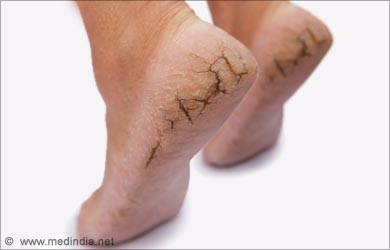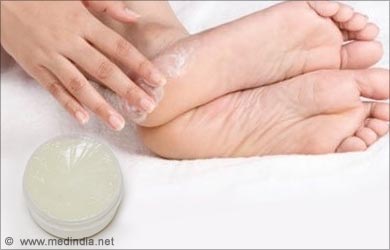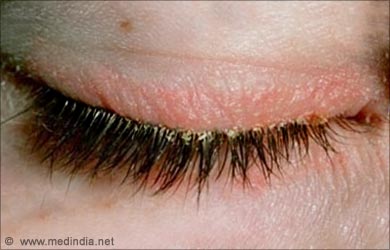Dry Skin on Face, Feet and Eyelids

Dry skin is a universal problem; people the world over are trying
to cope with dry skin and in the bargain, the manufacture of skin
products has become a billion dollar industry.
Causes of Dry Skin
There are many reasons why we get dry skin, which at times is flaky and patchy, and even develops rashes. Cold weather with harsh winds is one of the main reasons; low humidity and working in air-conditioned atmospheres for long periods are other common reasons.

Many people have genetically dry skin or suffer from skin disorders like psoriasis or eczema. Medications for diabetes and thyroid dry the skin out. One of the reasons for dry skin in older individuals is that - as you grow older, the oil glands produce less oil leading to skin dryness.

Here are some remedies for dry skin. Always consult a doctor before trying any of them for your dry skin.
Dry Skin on the Face
The face is exposed to all the elements like heat, cold and wind. It therefore becomes easily susceptible to dry skin. Here are some tips to manage dry facial skin.
Tip 1:
Start the day with this – take half a cup of unboiled milk at room temperature. Dip a pad of cotton wool and generously apply on the face and neck. Leave it on for 15 – 20 minutes and wash off. After a shower, pat the face dry and apply a moisturizer while the face is still moist.

Tip 2:
Splash some water from a tender coconut whenever possible. Do this at least twice a day when the dryness is acute as coconut water is one of the best natural moisturizers. Leave it on for 15 minutes before washing off.

Tip 3:
Mash ½ an avocado and mix the pulp with 2 teaspoons of honey. Mix it well and smear on the face for 10 minutes. Wash with warm water.

Tip 4:
Yogurt applied on the face and neck works in gently removing flakes of dry skin. Yogurt has lactic acid which soothes and refreshes the skin, and calms down the itchiness and skin rashes. Some ripe papaya pulp can be added to the yogurt and use it as a mask.
Tip 5:
Pumpkin has enzymes which are extremely good for a smooth satiny skin. Peel the pumpkin and grate the fleshy part, add a pinch of cinnamon powder to this, let it soak for a few minutes and use as a face mask.

Tip 6:
Clean off make up with cotton pads dipped in olive oil - it works on the skin as a moisturizer and adds a layer of fatty acids which don’t deplete the skin in any way.

Tip 7:
Use a gentle face wash rather than soap and avoid hot water which can be harsh on a sensitive dry skin.
Dry Skin on Feet
The skin on our feet is naturally dry compared to the rest of the body as there are no oil glands – only sweat glands. Dry feet can lead to fissures and cracks, which occur more often during extreme cold climate. Sometimes over exposure to direct sunlight can be a cause for dry skin on the feet. Hot and long baths and showers with strong and harsh soaps is another common reason.

Wearing comfortable cotton socks with shoes which allow your feet to breathe are definitely a benefit. For severe dryness of skin accompanied with rashes and scales, it would be a good idea to consult a dermatologist or a podiatrist. They may advise some blood tests to check for psoriasis, eczema or dermatitis.
There are some remedies which can arrest the problem when used at the initial stage. At times instead of aggravating the skin by scratching, rub some ice on the rashes to calm the burning and itchiness.
Tip 1:
Combine a spoonful of olive oil with a few drops of lemon juice and a few drops of lavender oil. Shake well till the oil becomes thick and creamy. Apply on feet and leave it on for an hour at least.

Tip 2:
Apply vegetable oil on the feet and wear a pair of socks. This can be kept on overnight for best benefit.
Tip 3:
Petroleum jelly is very popularly used for dry feet. Apply a thick layer at bed time and cover with cotton socks; repeat on a regular basis to keep the feet soft and smooth.

Dry Skin on the Eyelids
Dry eyelids are an issue many of us are plagued with. It can lead to a condition called blepharitis. When you have this condition, you are not only dealing with dry scales but itchiness, discoloration of the skin and soreness.

There are many reasons for this condition and some of them are directly related to hygiene and allergies. It may be due to a brand of shampoo or maybe hair dye, cologne, a moisturizer, eyeliner or an eye shadow. Sometimes, a feather pillow or a down comforter can be the culprit.
Most of us wash our faces under the shower spray with our eyes closed. Try to keep hot spray away from your eyelids and wash your face with tepid water, avoiding soap.
Tip 1:
Castor oil helps dryness of the eyelids. Aloe Vera gel gives immediate relief to eyelid rashes and scabs that are a result of dry skin and flakes. Use fresh gel if it is available or a preparation which has no preservatives.
Tip 2:
Give warm compresses to the eyes three to four times a day; use a clean wash cloth dipped in warm water – squeeze out excess water and place on both eye areas for 10-15 minutes. Continue at least once a day even when the eyelids are better.
Tip 3:
Wear a sunscreen and goggles whenever you go out in the sun.

Tip 4:
Avoid touching the eye area with unwashed hands.
Tip 5:
Cleanse face and eyes completely of make up before going to bed every night. Apply a moisturizer that suits you and keep pillows and comforters well aired and dusted. Vacuum the house regularly.
Causes of Dry Skin
There are many reasons why we get dry skin, which at times is flaky and patchy, and even develops rashes. Cold weather with harsh winds is one of the main reasons; low humidity and working in air-conditioned atmospheres for long periods are other common reasons.

Many people have genetically dry skin or suffer from skin disorders like psoriasis or eczema. Medications for diabetes and thyroid dry the skin out. One of the reasons for dry skin in older individuals is that - as you grow older, the oil glands produce less oil leading to skin dryness.

Here are some remedies for dry skin. Always consult a doctor before trying any of them for your dry skin.
Dry Skin on the Face
The face is exposed to all the elements like heat, cold and wind. It therefore becomes easily susceptible to dry skin. Here are some tips to manage dry facial skin.
Tip 1:
Start the day with this – take half a cup of unboiled milk at room temperature. Dip a pad of cotton wool and generously apply on the face and neck. Leave it on for 15 – 20 minutes and wash off. After a shower, pat the face dry and apply a moisturizer while the face is still moist.

Tip 2:
Splash some water from a tender coconut whenever possible. Do this at least twice a day when the dryness is acute as coconut water is one of the best natural moisturizers. Leave it on for 15 minutes before washing off.

Tip 3:
Mash ½ an avocado and mix the pulp with 2 teaspoons of honey. Mix it well and smear on the face for 10 minutes. Wash with warm water.

Tip 4:
Yogurt applied on the face and neck works in gently removing flakes of dry skin. Yogurt has lactic acid which soothes and refreshes the skin, and calms down the itchiness and skin rashes. Some ripe papaya pulp can be added to the yogurt and use it as a mask.
Tip 5:
Pumpkin has enzymes which are extremely good for a smooth satiny skin. Peel the pumpkin and grate the fleshy part, add a pinch of cinnamon powder to this, let it soak for a few minutes and use as a face mask.

Tip 6:
Clean off make up with cotton pads dipped in olive oil - it works on the skin as a moisturizer and adds a layer of fatty acids which don’t deplete the skin in any way.

Tip 7:
Use a gentle face wash rather than soap and avoid hot water which can be harsh on a sensitive dry skin.
Dry Skin on Feet
The skin on our feet is naturally dry compared to the rest of the body as there are no oil glands – only sweat glands. Dry feet can lead to fissures and cracks, which occur more often during extreme cold climate. Sometimes over exposure to direct sunlight can be a cause for dry skin on the feet. Hot and long baths and showers with strong and harsh soaps is another common reason.

Wearing comfortable cotton socks with shoes which allow your feet to breathe are definitely a benefit. For severe dryness of skin accompanied with rashes and scales, it would be a good idea to consult a dermatologist or a podiatrist. They may advise some blood tests to check for psoriasis, eczema or dermatitis.
There are some remedies which can arrest the problem when used at the initial stage. At times instead of aggravating the skin by scratching, rub some ice on the rashes to calm the burning and itchiness.
Tip 1:
Combine a spoonful of olive oil with a few drops of lemon juice and a few drops of lavender oil. Shake well till the oil becomes thick and creamy. Apply on feet and leave it on for an hour at least.

Tip 2:
Apply vegetable oil on the feet and wear a pair of socks. This can be kept on overnight for best benefit.
Tip 3:
Petroleum jelly is very popularly used for dry feet. Apply a thick layer at bed time and cover with cotton socks; repeat on a regular basis to keep the feet soft and smooth.

Dry Skin on the Eyelids
Dry eyelids are an issue many of us are plagued with. It can lead to a condition called blepharitis. When you have this condition, you are not only dealing with dry scales but itchiness, discoloration of the skin and soreness.

There are many reasons for this condition and some of them are directly related to hygiene and allergies. It may be due to a brand of shampoo or maybe hair dye, cologne, a moisturizer, eyeliner or an eye shadow. Sometimes, a feather pillow or a down comforter can be the culprit.
Most of us wash our faces under the shower spray with our eyes closed. Try to keep hot spray away from your eyelids and wash your face with tepid water, avoiding soap.
Tip 1:
Castor oil helps dryness of the eyelids. Aloe Vera gel gives immediate relief to eyelid rashes and scabs that are a result of dry skin and flakes. Use fresh gel if it is available or a preparation which has no preservatives.
Tip 2:
Give warm compresses to the eyes three to four times a day; use a clean wash cloth dipped in warm water – squeeze out excess water and place on both eye areas for 10-15 minutes. Continue at least once a day even when the eyelids are better.
Tip 3:
Wear a sunscreen and goggles whenever you go out in the sun.

Tip 4:
Avoid touching the eye area with unwashed hands.
Tip 5:
Cleanse face and eyes completely of make up before going to bed every night. Apply a moisturizer that suits you and keep pillows and comforters well aired and dusted. Vacuum the house regularly.
No comments:
Post a Comment